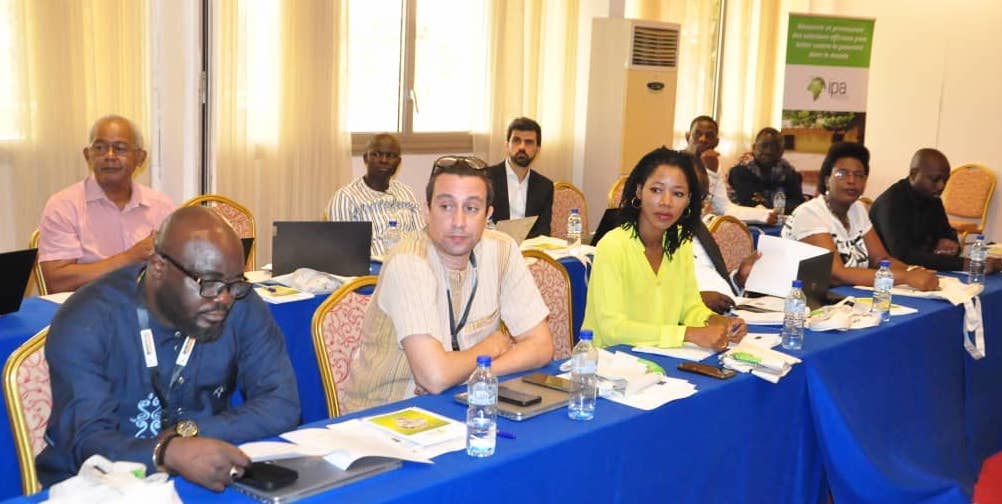IPA Francophone West Africa and the European Union Present on a Multifaceted Nutrition Study in Burkina Faso
The event was covered in local media, including L’Economiste du Faso, lefaso.net, and BF1 TV (begins at 18:10).
On December 6, 2022, IPA Francophone West Africa (IPA FWA) held a workshop to disseminate the final results of the impact evaluation of the Program of Resilience of Vulnerable Communities to Food and Nutritional Insecurity, funded by the Delegation of the European Union (DUE) under the EU Emergency Trust Fund, and implemented by two consortia of NGOs-PROMIRIAN and RESIANE-in Burkina Faso.
For the implementation of the research program, one hundred and 168 were randomly divided into four groups:
- Group 1 | Cash transfers: eligible households in 42 selected villages received cash transfers during the lean season,
- Group 2 | Cash transfers + productive assets: In addition to the cash transfer, eligible households in 41 villages were given the option to choose between livestock vouchers that could be exchanged for sheep or chickens, or seed vouchers that could be exchanged for improved varieties of seed.
- Group 3 | Cash transfers + productive assets + nutrition: Households in 42 villages received cash transfers, productive assets and nutritional assistance.
- Control group | Households in 43 villages did not receive any of the above interventions.
The workshop brought together policymakers, researchers, technical experts and implementing partners involved in health and nutrition. Andrew Dillon (Northwestern University) and Aliou Diallo (IPA FWA), both principal investigators for the project, presented the results. The findings indicate that the different components (cash transfers, productive assets, nutrition) of the program had a positive impact on child nutrition, productive investments, and household finances

- Impact on child nutrition
- Households that received the full package (T3) had a one-third decrease in their children's chronic nutrition one year after the end of the program;
- Children's cognitive and motor development slightly increased in the T3 group;
- Food insecurity decreased in all intervention groups, and persistently in the T2 group;
- Impact on productive investments
- Households used cash transfers to increase their farming assets, and this impact persists two years after the end of the program;
- The number of farming plots also slightly increases one year after the program ended (+0.384 Ha);
- The value of transferred livestock (poultry/sheep) increased in T2 and T3. For T2, the impact persists two years after the end of the program
- Financial impact of the program
- The whole program also encouraged savings, and all intervention groups repaid loans;
- Households in the treatment groups borrowed less;
- In general, the program reduced the number of very poor people, particularly for the full program (T3).
- Implications for the design of social protection programs
- Social protection programs should promote sustainable investments (Productive investments (agricultural equipment), Human investments (nutrition, education, health));
- Simple cash transfer programs do not appear to produce significant sustainable investments: a large portion of transfers were used for subsistence (food) & a good portion of animal transfers were eaten, lost or sold after the interim survey;
- Programs combining cash transfers & productive investments appear to be more effective over the long term;
- Despite difficult security conditions, a program of this type can be effectively implemented.
Participants, including policymakers, representatives of NGOs and international organizations discussed public policy evaluation methods and tools, particularly Randomized Controlled Trials (RCTs). This allowed for conversation on methodology, including the ethical dimension of RCTs, the spillover effect of similar interventions on the control group that can compromise the analysis of program impact, and the anticipation of the influence of household loss on the study results.
This event was timely given Burkina Faso’s ongoing food insecurity and humanitarian crisis. It also provided a platform for policymakers and development practitioners to discuss research findings in order to inform multifaceted resilience and social protection programs.
Prior to this dissemination, the findings were shared on October 17, 2022, during a diagnostic workshop for the development of the National Social Safety Net Program, which is being scaled up after a successful pilot phase. The workshop was organized by the Ministry of National Solidarity and Humanitarian Action of Burkina Faso, and was attended by actors involved in the field of social protection, including the Ministry of Finance, Economy and Forecasting, the Permanent Secretariat of the National Council for Social Protection, the World Bank, the Food and Agriculture Organization of the United Nations (FAO)












